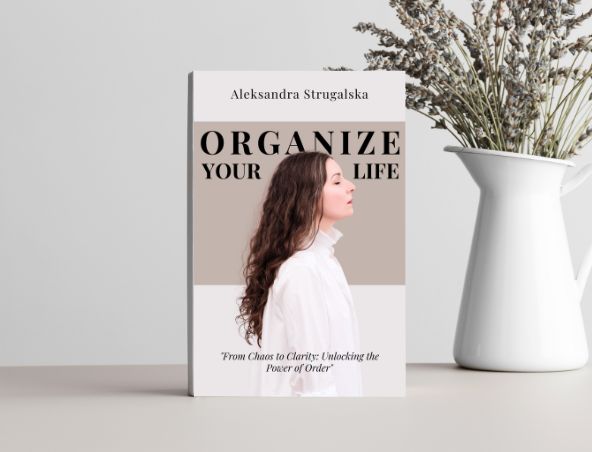
The Art of Making the Right Decisions

Before Christmas, I placed a significant order with Zara, with the intention of trying on all the clothes that had caught my eye in the application and keeping the ones that fit best, while returning the rest. Knowing that I’d likely return at least half of the order, I didn’t pay much attention to the prices of the selected items, as not all of them would stay with me anyway. When the packages arrived, I spread them out on the table and began my own fashion show. My beloved cat sat quietly on the couch, observing all the commotion. I stepped into the kitchen briefly to get a glass of water.
Upon my return, I discovered a tomcat in one of the boxes, perched on a cashmere dress from the premium collection, tearing a hole in the middle of the product with silent and intense concentration. I was on the brink of a heart attack, sustained only by a mixture of despair and anger. I hadn’t even had the chance to try on the clothes, measure them, cut the tags, or decide whether I wanted to keep them. Besides shooing the cat out of the box, my first instinct was to try to limit the damage. My initial thought was, ‘I’ll return it to the store and explain that it arrived this way, after all, how could they prove otherwise? The customer is always right, especially in corporations and chain stores.’
I began the return process, all the while feeling a sense of despair, repeatedly glancing at the price on the receipt, which unfortunately remained unchanged no matter how many times I checked it. However, in the midst of executing my ‘clever’ plan, a thought struck me: ‘This is dishonest; I have no right to a refund!’ I tried to justify my actions by telling myself that if I had ordered from a small Polish entrepreneur, I wouldn’t return it, but Zara, with its high profit margins and exploitation of employees, deserved it. Initially, I even considered it a glimpse of karma that they were receiving for their wrongdoings. As my thoughts and inner dialogue grew more insistent, I realized that it didn’t matter whom I was deceiving; it was still deceit. Passing judgment and punishing simultaneously is not our prerogative, just as I was trying to rationalize my actions by condemning the big store and penalizing Zara.
If I strongly believe they deserve some form of retribution and disagree with their practices, I should simply refrain from purchasing from them. Does stealing from a stranger or a wealthy individual, whom we believe has plenty, make our action any less of a theft? Unfortunately not.
When it comes to core values and moral principles in general, especially those that are simple and clearly defined, discerning right from wrong is often straightforward. We know when something is right, but due to our comfort, fear, or other reasons, we sometimes try to silence our intuition and moral compass. If we feel insecure, ashamed, or uncertain, it’s likely because we are violating a moral code and attempting to rationalize and deceive ourselves while distorting reality.
"No! It wasn't like that. You don't understand, I had to!

How often do we hear such explanations? And what do we think in response? Typically, our thoughts are far from objective; we often yield to emotions and the subjective perspectives of our family and friends. When I returned to work after Christmas and shared the incident, omitting some of my thoughts about doing the right thing, I frequently heard responses like, ‘Don’t worry, just send it back; probably, no one will notice,’ or ‘What did you do to the cat?’ or ‘Tell the store that you received a damaged item; they’ll refund your money.’ My friends said these things not because they are bad people, but because they sensed my distress and wanted to help.
However, it’s impossible to help someone while causing harm to others because good fruits do not result from bad deeds. They were temporarily blinded by our acquaintance and their positive feelings toward me. They didn’t look at the situation objectively; they only saw one side of the equation—the unfortunate situation that had befallen Ola and the cat, who happened to purchase an item from the premium collection. Their intentions were to protect someone within their circle without considering that someone might treat them the same way in the future, leading to an entirely different discussion. Let’s strive to view situations more broadly than just through the lens of our own immediate interests and ‘herd’ mentality.
In such situations, I believe the best sign of friendship and affection we can offer is to convey the truth as we see it, even if it’s an inconvenient truth. The path of good deeds and right choices is often challenging, much like maintaining a true and sincere relationship. We won’t always receive praise from the other side; sometimes, the best others can do for us is to guide us toward self-improvement, even if it involves a painful journey over rocky terrain. A true friend is one who tells you the truth, even when it’s uncomfortable, distressing, or painful.
„I believe the truth is offensive only when we lie”
Matthew McConaughey
My extensive shopping spree at Zara concluded with a dilemma – a hole in a dress from the premium collection. Despite it being a tad too big, it was pleasing to the touch, and its cost was so substantial that if it had turned out scratchy, it would have felt like a nail in my coffin 😛. I thought, ‘Who cares? Maybe I can patch it up somehow.’ I went to my husband to share my fashion fiasco, expecting him to lament the loss even more than I did.
To my surprise, he, among the few around me (my mother held a similar opinion), didn’t immediately suggest returning the dress to the store. Instead, he expressed his regret that my shopping had ended in such a mishap and pointed out that I’m skilled at sewing. His faith in my ability to mend the sizable hole was unwavering. Initially, I felt a sense of loss, but as I made the right choice, I found peace within myself. Looking in the mirror, I realized that being a good person isn’t solely about making substantial donations to an orphanage; it’s about making the right choices.
I had every opportunity to take a different path, deceive others, shift the loss onto someone else, and preserve my own interests. But I opted for a different course. It’s essential to remember that behind Zara, there’s a person who likely earns more in a second than what I spent on the dress. However the essence of being a hero isn’t about impressing anyone by graciously choosing not to rob them; it’s about being a hero in our own eyes and upholding our self-respect. How can I expect others to choose the right path if I’m not willing to do so myself?
"[...] It is worth being a decent person at all times, even if it does not always pay off".
Anna Dymna
In the world of business, the art of making the right decisions is of paramount importance. However, this skill extends far beyond the corporate realm; it’s also a crucial aspect of our everyday, private lives. For those who might be thinking, ‘But Ola is wonderful; she made the right choice,’ I would say, ‘STOP!’ It’s commendable that I chose to do what was right, but should that really be a cause for celebration? Shouldn’t making the right choices be the standard and the norm?
Instead of patting me on the back for not robbing anyone, let’s use this article as an opportunity to draw deeper insights, even if it revolves around something as seemingly trivial as a Zara dress 😊. If you’ve never pondered such situations before, now isn’t the time to dwell on past wrongdoings or engage in months of self-flagellation. This is the perfect moment to make a difference! Recall your fundamental values and begin making the right choices, even in the smallest matters. Above all, remember that doing good isn’t always convenient or immediately pleasant, but in the long run, it’s immensely rewarding.
If you’re not motivated to do good for the sake of others or out of love for your neighbor, then do it primarily for yourself. After all, you spend the most time with yourself, engage in the most conversations with yourself, and see your own reflection in the mirror most frequently. Self-confidence and self-esteem are unattainable without self-respect, and self-respect hinges on consistently doing what’s right. While wallets and wardrobes may change each year, your soul, regardless of your religious beliefs, remains a constant – you have only one, so take care of it.

Organize your life.
The first publication in the Untold product series, created to share methodology for organizing everyday life, cultivating systematic discipline, and developing proper habits. Drawing from the author's experience, knowledge, beliefs, and commonly available coaching tools, she aims to inspire you to take action and present you with a straightforward approach to achieving fulfillment and building self-esteem. Written in a simple way, it contains examples from everyday life, practical tips, exercises, and beautiful graphics. Available in e-book and audiobook.




Leave a Reply